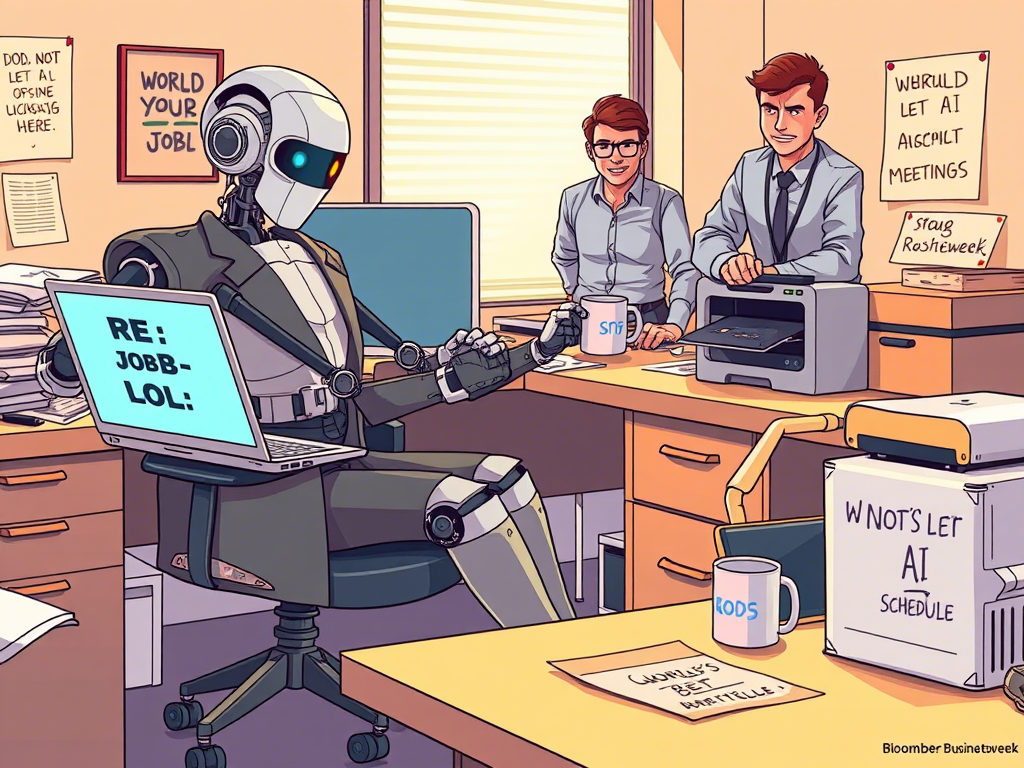Let me tell you a story. Last Tuesday, I caught my laptop judging me. Not with words—it was more of a vibe. I’d been staring at the same Excel sheet for 45 minutes, trying to remember how pivot tables work, when that little Clippy-esque AI assistant popped up: “Need help with those numbers?”
I swear it sighed.
This is our reality now. Artificial intelligence isn’t some far-off sci-fi concept—it’s sitting in our meetings, drafting our emails, and probably rolling its digital eyes at how long it takes us humans to figure out Slack. But here’s what nobody’s telling you straight: AI isn’t coming for your job. It’s coming for the parts of your job you never liked anyway.
The Great Office Takeover (That Isn’t Happening)
Remember when everyone panicked about self-checkout lanes replacing cashiers? Turns out we still need humans to explain why the machine keeps screaming “UNEXPECTED ITEM IN BAGGING AREA” when there’s clearly nothing there.
AI in the workplace is exactly like that—equal parts helpful and hilariously incompetent.
What AI Actually Does Well:
- Email Triage: It can spot that urgent client email in your flooded inbox (but still can’t decode your boss’s passive-aggressive “Per my last email…”)
- Data Drudgery: Crunches numbers faster than you can say “monthly report” (though it will dutifully include that one outlier that makes no sense)
- Schedule Tetris: Finds meeting times that work for everyone (except Dave, because Dave is always “in back-to-backs”)
Where AI Epicly Fails:
- Understanding when “Sounds good!” actually means “I hate this idea but don’t want to argue”
- Telling if the CEO’s new “casual Friday” policy is a test of professionalism
- Knowing which coworkers to avoid before they’ve had their morning coffee
Your New Work Wife: How to Use AI Without Getting Fired
I’ve been experimenting with AI tools since that awkward phase when ChatGPT kept writing like a Victorian novelist. Here’s what actually works in real office life:
1. Make It Your Boring Task BFF
Last month, I delegated my least favorite job—writing meeting summaries—to an AI tool. The result? Surprisingly decent notes… that completely missed when Mark sarcastically said “Great idea” to Sarah’s terrible suggestion. Moral: Always review for office politics.
2. Train It Like a New Intern
The secret? Specificity. Instead of “Write a project update,” try:
*”Draft a 3-paragraph email to clients about the delayed Beta launch—sound professional but not panicked, mention we’re adding new features, and for god’s sake don’t use the word ‘synergy.'”*
3. Know When to Take the Wheel
AI once suggested I resolve a client complaint by offering them “a heartfelt handwritten note and 15% discount.” Our CFO nearly had an aneurysm.
The Jobs That Are Actually Safe (For Now)
Let’s cut through the hype:
Not Going Anywhere Soon:
- Jobs requiring actual human judgment (ever seen AI try to mediate an office feud?)
- Roles where creativity isn’t just rearranging existing ideas (AI “art” still can’t get hands right)
- Anything involving reading between the lines (like decoding “As per my last email”)
Might Want to Upskill:
- Data entry clerks (sorry)
- Basic content mills (AI writes mediocre SEO bait better than humans)
- Anyone whose job is just moving information from one spreadsheet to another
The Uncomfortable Truth
Here’s what no tech bro will admit: AI makes a fantastic assistant but a terrible decision-maker. It can:
✔ Generate 50 versions of a marketing email
✔ Analyze customer feedback in seconds
✔ Even predict which projects might fail
But it can’t:
✖ Tell you when to break the rules for a good reason
✖ Navigate the minefield of office hierarchies
✖ Understand why Karen from Accounting gets that special font in her reports
How to Future-Proof Your Career
- Become the AI Whisperer
The person who knows how to get useful results from AI tools is suddenly everyone’s favorite coworker. - Double Down on Being Human
Sharpen skills AI can’t replicate—critical thinking, emotional intelligence, creative problem solving. - Own Your Weird
AI can mimic competence, but it can’t fake your unique perspective (or your legendary coffee runs).
The Bottom Line
Will AI change how we work? Absolutely. Is it coming for your job? Only if your entire role could be done by a slightly smarter toaster.
The real opportunity? Letting AI handle the tedious parts while you focus on the work that actually requires a human brain—and occasionally reminding it that no, we don’t actually want to “disrupt” the quarterly report with emojis.
Now if you’ll excuse me, I need to go troubleshoot why the AI scheduler thinks 7 AM meetings are “optimal for productivity.” Some battles still require human intervention.



